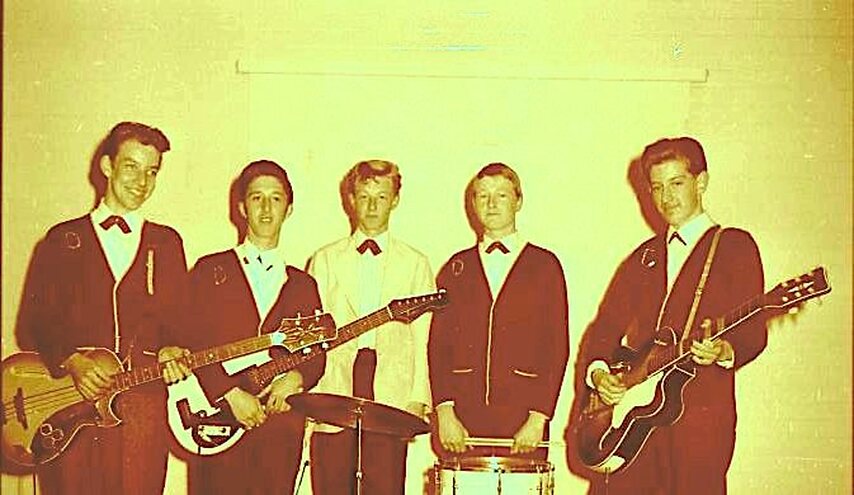 The penultimate item on the Antiques Road Show yesterday caused me to do a double take; it was a hat, accompanied by a face and voice I knew well. I was at school with Mick O’Donnell, known to the world at large as Don Craine, leader and guitarist with the Downliners Sect. The Road Show was at Ham House on the Thames, not far from Eel Pie Island where Mick’s band used to alternate with the Rolling Stones in the island’s ‘jazz club’ in the early Sixties. Don was showing some memorabilia of those times, and it was all very poignant for me, because Don died just a couple of weeks ago. We both started at Gunnersbury Catholic Grammar School in 1956, but it was early 1960 when I got to know Don and his mates well. I had started to learn the guitar, and took my instrument to school one day, playing ‘The Rose of Tralee’ during the lunch break. Don had a band called The Downliners, named after a Roy Orbison song, Down the Line. The band needed a guitarist, I could play a few chords tolerably well, so at the tender age of 14, I was co-opted. The centre of gravity of the band was Don’s house in Twickenham where he lived with his mother and father. Don’s father was a gentle Irishman, of whom Don was the spitting image; his mother was a fairly terrifying English lady who reminded me a bit of Miriam Karlin. She became the ‘manager’, and I must admit she was very good at it. I was young for my age, looked it, and behaved it. I was decidedly not streetwise, so my single qualification, my entrée into the fast set that revolved around Don, was my ability to work out the chords of the various material we performed—all covers of popular music—and play them. In parallel with our musical activities, I was inducted into the band’s social life: Seedy coffee-bars, hanging around street corners, illegal entry into 'X' films, occasional dances, and the very occasional, and highly illegal, consumption of alcohol... Over the next year or so we rehearsed music together, acquired better guitars and amplifiers, and beginning in the summer of 1961 we started to get paid gigs around the home counties in dance halls, clubs, and American Airforce bases. I recall playing at Walthamstow Assembly Rooms when the manager announced us saying that, extraordinary as it may seem, we were all only sixteen years old. (This was a slight fib, Barry was nearer 18.) There were various changes to the line-up, but the ‘regulars’ between 1961 and 1962 were as shown in the photograph: from left to right, Kevin Buley on bass, Don, Barry Allmark, vocals, Pete Coulson and me. Kevin and Don were in my class at school. We played at least twice at the Saturday Night 'club' in Chislehurst Caves, a completely wild event. There were usually three or four bands in different parts of the caves, and the noise level approached pain threshold. And I can now reveal to the world that it was Don, when we were playing in a large hall on the sea front at Dovercourt, who plugged one of the hall’s expensive moving-coil microphones into the National Grid, the delicate innards promptly evaporating into an ephemeral puff of smoke. One event stands out. We were coming back from a US Airforce base gig in Suffolk, transport being provided by an old van complete with driver. Mr and Mrs O’Donnell were with us for some reason so there were eight people crammed into the van—six in front, and me and Mr O’Donnell in the back, separated from the rest by drums and amplifiers. The driver saw fit to tell an absolutely disgusting joke which Mrs O’Donnell laughed at. It was so awful I could not possibly repeat it. Mr O’Donnell, normally a quiet, gentle, and reserved man went completely incandescent. Unable to get at the driver he shouted “Stop the car! Stop the car! Stop the feckin' car; stop the feckin' car!” Wisely, the driver did not stop, and I managed to calm Mr O’Donnell down eventually. “Stop the feckin' car” became a bit of a catch-phrase thereafter. Don had those indefinable qualities, style and originality. He reformed the band as the Downliners Sect, and adopted his signature headwear, the deerstalker hat. He also kept a penguin in a pool in his back garden. “I wanted a leopard”, he told me, “but the council would not allow it...” The new band made a name for itself as a rhythm ‘n’ blues combo, creating a significant following. I saw them once in a club in the West End and they were a very good indeed. They even had a No 1 hit in Sweden; some of their later CDs are very entertaining, and I have several. The last time I met Don was in the gents at Waterloo Station about five years ago—not by appointment. I wondered who the aged, long-haired hippy was, and we greeted each other with great amusement. Mick O’Donnell changed my life. He introduced a shy and spotty nerd into his circle, broadening my horizons enormously and opening up a world previously unknown. I left the band in 1962, before the ‘Sect’ times, and eventually joined another band. When that folded, I did other things. Don made his living from the band from that day to this, doing live gigs and selling CDs and other merchandising. I regret that a quite recent attempt of mine to organize a reunion of some of the old band members and other pupils at the school failed.
0 Comments
Leave a Reply. |
AuthorWelcome to the Mirli Books blog written by Peter Maggs Archives
March 2024
Categories |
 RSS Feed
RSS Feed